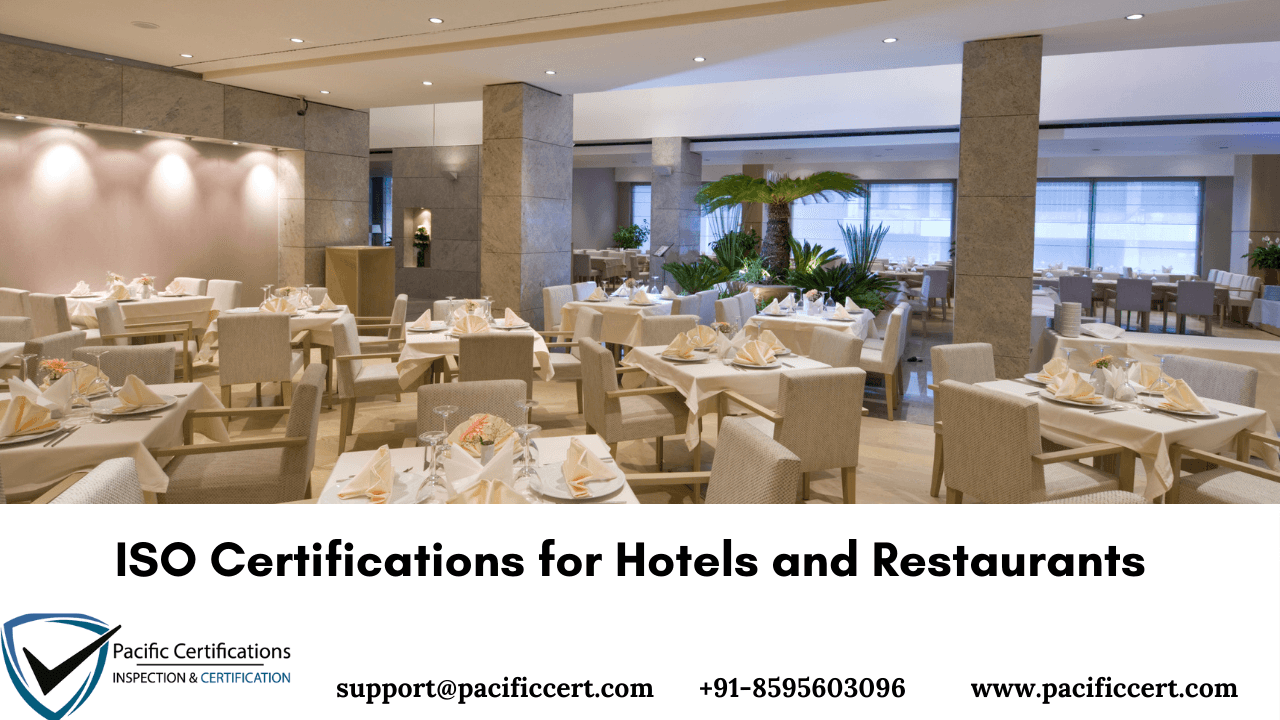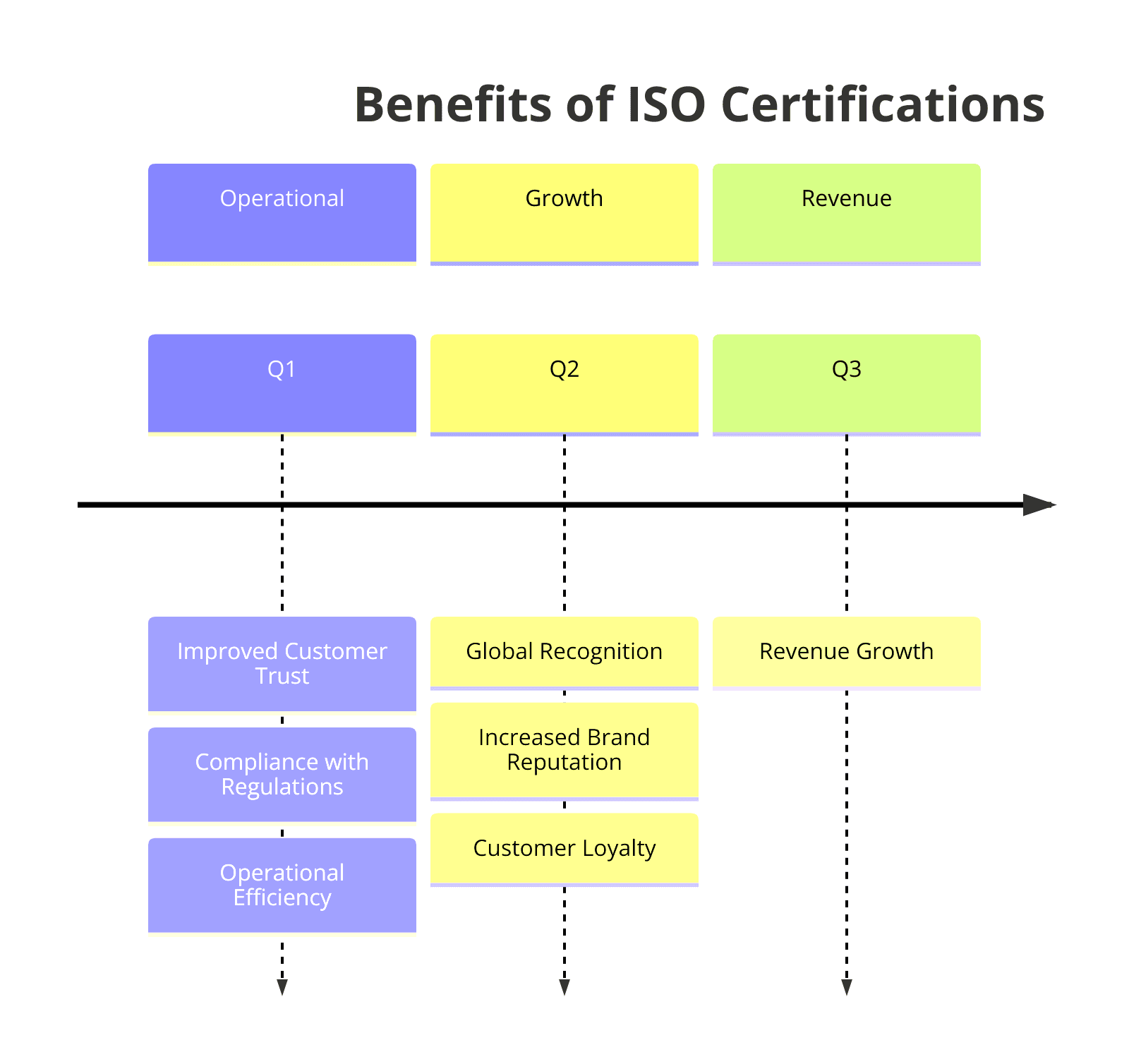ISO Certifications for Hotels and Restaurants, Requirements and Benefits

ISO Certifications for Hotels & Restaurants
The hospitality industry, which includes hotels, restaurants, and catering services, is one of the most dynamic sectors worldwide. According to industry forecasts, the global hospitality market is expected to surpass USD 5.8 trillion by 2027, driven by rising tourism and consumer expectations for quality service, and digital transformation in guest experiences. Guests today expect not only comfort and good food, they demand safety, hygiene, and consistent service quality.
ISO certifications provide hotels and restaurants with internationally recognized frameworks to meet these demands. ISO 9001 ensures that these establishments maintain consistent service quality, meeting customer expectations through standardized processes.
ISO 14001 helps hotels and restaurants manage their environmental responsibilities, promoting sustainable practices like energy conservation and waste reduction. Additionally, ISO 22000, which focuses on food safety management, is particularly crucial for restaurants, ensuring that food handling, preparation, and storage meet international safety standards.
Altogether, these certifications increase efficiency and customer satisfaction, positioning hotels and restaurants as trustworthy and responsible businesses.
In hospitality, trust is built not only on service and ambiance but also on the systems that ensure safety, quality, and sustainability.
If you need support with choosing the right ISO certification for your Hotel or Restaurant, contact us at [email protected].
Applicable ISO standards for Hotels & Restaurants Industry
The hospitality industry can benefit from several ISO standards to ensure quality, safety, sustainability, and customer satisfaction. Here are some of the most applicable ISO standards for the hospitality industry:
ISO 9001:2015 (Quality Management System)
This standard focuses on improving customer satisfaction and overall quality by establishing a systematic approach to quality management. It can help hotels and restaurants enhance their services and operations.
ISO 14001:2015 (Environmental Management System)
Sustainability is becoming increasingly important in the hospitality sector. ISO 14001 helps organizations reduce their environmental footprint and manage environmental risks.
ISO 22000:2018 (Food Safety Management System):For restaurants, ensuring food safety is paramount. ISO 22000 provides a framework for managing food safety hazards throughout the supply chain, from food production to consumption.
ISO 45001:2018 (Occupational Health and Safety Management System)
The safety and well-being of employees and guests are critical in the hospitality industry. ISO 45001 assists in identifying and mitigating health and safety risks.
ISO 27001:2022 (Information Security Management System)
Given the handling of sensitive customer data, information security is crucial. ISO 27001 helps protect against data breaches and other security threats.
ISO 50001:2018 (Energy Management System)
Managing energy efficiently is essential for hotels and restaurants. ISO 50001 can help reduce energy consumption and improve sustainability.
ISO 20121:2012 (Event Sustainability Management System)
For hotels hosting events, ISO 20121 helps ensure that events are sustainable, environmentally friendly, and socially responsible.
ISO 10002:2018 (Customer Satisfaction Management System)
This standard focuses on handling customer complaints and feedback effectively. It can help improve customer satisfaction and loyalty.
ISO 18295:2017 (Service Quality for Customer Contact Centers)
For hotels with call centers or customer service operations, ISO 18295 provides guidelines for delivering quality service over the phone.
ISO 21401:2018 (Sustainability in Accommodation Establishments)Specifically designed for accommodation providers, ISO 21401 provides guidelines for implementing sustainable practices in hotels.
ISO 31000:2018 (Risk Management)
Risk management is crucial in the hospitality industry. ISO 31000 offers principles and guidelines for risk management processes.
ISO 55001:2014 (Asset Management)
Hotels can benefit from this standard by optimizing the management of their physical assets, such as buildings, equipment, and infrastructure.
ISO 56002:2019 (Innovation Management)
Innovation is essential for staying competitive. ISO 56002 provides guidance on establishing and maintaining an innovation management system.
ISO 21101 (Adventure Tourism – Safety Management Systems)
For hotels or establishments offering adventure tourism activities, this standard focuses on safety management specific to adventure tourism.
Before pursuing any ISO certification, it's essential to assess your hotel or restaurant's specific needs and objectives. Certification processes can be resource-intensive and require commitment from all levels of the organization.
What are the requirements of ISO Certifications for Hotels & Restaurants?
To achieve ISO certification for hotels and restaurants, organizations must follow a series of steps and meet specific requirements. Here is a general overview of the requirements and steps for some of the most relevant ISO certifications for the hospitality industry:
ISO 9001:2015 (Quality Management System) Requirements
Establish a quality management system (QMS): Develop and document processes, policies, and procedures that ensure the consistent delivery of quality services and products.
Risk-based thinking: Identify and assess risks and opportunities that may affect the QMS and implement appropriate actions to address them.
Customer focus: Ensure a strong commitment to meeting customer requirements and enhancing customer satisfaction.
Continuous improvement: Implement processes for monitoring and measuring performance, conducting internal audits, and taking corrective actions as needed.
ISO 14001:2015 (Environmental Management System) Requirements
Environmental policy: Develop and communicate an environmental policy that outlines the organization's commitment to environmental protection.
Environmental aspects and impacts: Identify and assess the environmental aspects and impacts of your operations and develop plans to mitigate negative effects.
Legal compliance: Ensure compliance with relevant environmental laws and regulations.
Emergency preparedness and response: Establish procedures for responding to environmental emergencies.
ISO 22000:2018 (Food Safety Management System) Requirements
Hazard analysis: Identify and assess food safety hazards in all stages of food production and service.
Control measures: Implement control measures to prevent, eliminate, or reduce food safety hazards.
Prerequisite programs: Establish and maintain prerequisite programs (e.g., sanitation, pest control) to ensure food safety.
Monitoring and measurement: Regularly monitor and measure food safety performance and conduct internal audits.
ISO 45001:2018 (Occupational Health and Safety Management System) Requirements
Occupational health and safety policy: Develop and communicate a policy that demonstrates the organization's commitment to employee safety and health.
Risk assessment: Identify workplace hazards and assess risks to employee health and safety.
Emergency preparedness: Establish procedures for responding to workplace emergencies and incidents.
Worker participation: Involve employees in health and safety decisions and processes.
ISO 27001:2022 (Information Security Management System) Requirements
Information security policy: Develop and communicate an information security policy outlining the organization's commitment to protecting information assets.
Risk assessment and treatment: Identify information security risks, assess their impact, and implement controls to mitigate these risks.
Incident response: Develop an incident response plan for managing and reporting information security incidents.
ISO 50001:2018 (Energy Management System) Requirements
Energy policy: Develop and communicate an energy policy outlining the organization's commitment to energy efficiency and conservation.
Energy review: Identify significant energy uses and establish energy performance indicators (EnPIs).
Energy objectives and targets: Set energy objectives and targets to improve energy performance.
Monitoring and measurement: Regularly monitor and measure energy performance and conduct internal audits.
Tip: Hotels and restaurants often start with ISO 22000 (food safety) and ISO 9001 (quality), then expand into ISO 14001 and ISO/IEC 27001 to address sustainability and data security.
General steps
Gap analysis: Evaluate your current practices against the requirements of the chosen ISO standard.
Documentation: Develop the necessary policies, procedures, and documentation to meet the standard's requirements.
Implementation: Implement the policies and procedures throughout your organization.
Training: Provide training to employees to ensure they understand and can comply with the requirements.
Internal audit: Conduct internal audits to assess compliance with the standard.
Certification audit: Engage a certification body to conduct an external audit to assess compliance with the ISO standard.
Certification: If the organization meets the requirements, the certification body issues ISO certification.
Continuous improvement: Continually monitor and improve your management system to maintain compliance with the standard.
It's important to consult with a certification body experienced in the hospitality industry to guide you through the certification process effectively.
Contact us today to start your certification journey!
What are the benefits of ISO Certifications for Hotels & Restaurants?
Obtaining ISO certifications for hotels and restaurants can offer a wide range of benefits. Here are some of the key benefits:
Higher customer satisfaction through consistent service quality and complaint handling.
Safer food preparation and service, reducing risks of contamination and foodborne illness.
Stronger compliance with health, safety, and environmental regulations.
Enhanced workplace safety, lowering risks of accidents in kitchens and facilities.
Reduced operating costs through energy savings and waste reduction.
Improved brand reputation, attracting more guests and repeat customers.
Increased competitiveness in tenders, corporate partnerships, and tourism contracts.
Long-term business resilience through structured risk management and continuity planning.
Market Trends
The hospitality sector is rebounding strongly after pandemic disruptions, with the global market projected to grow at a CAGR of 7% through 2032. Technology integration is reshaping guest experiences — from AI-powered concierge services to digital booking platforms and personalized loyalty programs. At the same time, sustainability has become a central expectation: nearly 70% of travelers in recent surveys say they prefer eco-friendly accommodations and restaurants that demonstrate environmental responsibility.
Food safety remains a non-negotiable priority as global supply chains grow more complex, making ISO 22000 and HACCP essential. Data security is another rising concern — with hotels and restaurants increasingly targeted by cyberattacks, ISO/IEC 27001 is becoming a competitive necessity. Employee well-being and workplace safety also remain under close regulatory scrutiny, making ISO 45001 a valuable tool. Together, these trends underscore the importance of ISO certifications in helping hospitality businesses stay competitive, compliant, and trusted.
Overall, ISO certifications can help hotels to reduce risks and enhance their image as responsible and reliable service providers.
If you need more support with any ISO certification for your Hotel or Restaurant, please contact us at +91-8595603096 or [email protected].
Ready to get ISO certified?
Contact Pacific Certifications to begin your certification journey today!
Author: Pushpinder Kaur
Suggested Certifications:
Read more: Pacific Blogs
